Edie Melson's Blog, page 369
August 14, 2015
Write Smart: Don't Dumb Down Your Writing & Insult Your Readers
by Vonda Skelton @VondaSkelton
 Readers are smart. They’re smart because they read. And if there’s one thing smart readers hate, it’s when writers treat them like they’re dumb.
Readers are smart. They’re smart because they read. And if there’s one thing smart readers hate, it’s when writers treat them like they’re dumb.
One way writers dumb down their readers is by info-dumping.Check out these examples:
“When are things going to get back to the way they were before? Can you believe it’s been ten years since daddy left us?”
Marsha turned from her sister and wiped a tear. “We had to move into public housing and go on food stamps. Then our brother died and Daddy never [image error] even knew. And then you had to ago into rehab. It’s all his fault.”
Let’s be honest here, would we ever have a conversation like that with our siblings? I doubt it. After all, it’s simply a retelling of facts we would both already know. It’s dumping info on to the page for the perceived benefit of the reader. But our readers won’t appreciate the so-called benefit. They can see through our ruse. They know that we’re taking the easy way out. A good writer will bring those backstory details into the plot layer by layer, revealing facts and motivations through dialogue and POV in a more subtle, natural delivery. One detail may come out on page 5 when Marsha stands in line behind someone with food stamps. Another might be revealed on page 23 when Marsha picks up her sister at rehab and they realize it’s been exactly 10 years since their father left. Using this technique, your reader will be challenged and satisfied by putting together the pieces of the puzzle.
A good writer will bring those backstory details into the plot layer by layer, revealing facts and motivations through dialogue and POV in a more subtle, natural delivery. One detail may come out on page 5 when Marsha stands in line behind someone with food stamps. Another might be revealed on page 23 when Marsha picks up her sister at rehab and they realize it’s been exactly 10 years since their father left. Using this technique, your reader will be challenged and satisfied by putting together the pieces of the puzzle.
Another way to distance our readers is through unnecessary explanation. Ever read passages similar to these? “I don’t care what you think!” Melanie yelled again. She wanted to be sure Jason had heard her. Carly placed the rock on the gravestone and cried because she missed her mother so much.
In these two instances, the writer assumes the reader isn’t smart enough to figure out the characters’ motivations, so he or she writes out an additional explanation. But smart readers don’t appreciate the extra work the writer has done. Instead of being a help, it’s an insult to their reading intelligence. Well-written passages with well-developed characters don’t need explanation.
Which brings me to the reason you’re getting this lesson today. This past Sunday was my 61st birthday, complete with birthday wishes and jokes about getting older. After church a funny thing happened as Gary and I prepared for lunch…and I just had to share it with my Facebook friends.
Here’s the story, copied and pasted from my Facebook page: Okay, I’ll give all of you a laugh at my expense. This afternoon Gary asked me what the two slices of bacon were doing in the microwave. I told him it wasn’t me, that I hadn’t eaten any bacon since I made that BLT on Friday. To which he asked, “Did you put bacon on it?”
I started to say, “Of course I did. What do you think I am–Stupid?” But before I could say it, I suddenly remembered that I thought the BLT didn’t have any flavor. Now I know why.
There was no B in the BLT.
As my friend, Karen O’Connor says in her book, “Getting old ain’t for wimps…”
 Although there are several things I would have written differently if I were writing it for real publication, here are some things I did take the time to address.
Although there are several things I would have written differently if I were writing it for real publication, here are some things I did take the time to address.
When I initially wrote it, I explained that I had forgotten to put the bacon on my sandwich two days before. And I really wanted to create more set-up by telling that Gary and I had discussed flavorless winter tomatoes days before, setting me up to think it was the tomatoes that caused the flavorless sandwich.
But then it hit me: Readers don’t really care that we had discussed tomatoes earlier, or that as a multitasking professional, I had moved on to other things and forgotten about the bacon in the microwave.
As a matter of fact, if I had it to do over again, I’d probably leave off the reference to Karen O’Connor’s book, simply because adding anything after the punchline takes away from the delivery.
But one thing I think did go well was: There was no B in the BLT.
Short, to the point, and without explanation. I trusted my readers to get it.
And they did.
Treat your readers with respect and they’ll love you for it.
Can you recall a time the author info-dumped on you? Have you experienced your own info-dumping? Don’t forget to join the conversation!
TWEETABLESWrite Smart: Don't Dumb Down Your Writing & Insult Your Readers - @VondaSkelton (Click to Tweet)
Trust your readers & yourself when you write - @VondaSkelton on @EdieMelson (Click to Tweet)
 Vonda Skelton is a speaker and the author of four books: Seeing Through the Lies: Unmasking the Myths Women Believe and the 3-book Bitsy Burroughs mysteries for children 8-12 yo. She’s the founder and co-director of Christian Communicators Conference, offering speakers’ training and community for Christian women called to ministry. Vonda is a frequent instructor at writer’s conferences and keynotes at business, women’s, and associational events. You can find out more about Vonda, as well as writing opportunities and instruction at her writer’s blog, The Christian Writer’s Den at VondaSkelton.com.
Vonda Skelton is a speaker and the author of four books: Seeing Through the Lies: Unmasking the Myths Women Believe and the 3-book Bitsy Burroughs mysteries for children 8-12 yo. She’s the founder and co-director of Christian Communicators Conference, offering speakers’ training and community for Christian women called to ministry. Vonda is a frequent instructor at writer’s conferences and keynotes at business, women’s, and associational events. You can find out more about Vonda, as well as writing opportunities and instruction at her writer’s blog, The Christian Writer’s Den at VondaSkelton.com.
 Readers are smart. They’re smart because they read. And if there’s one thing smart readers hate, it’s when writers treat them like they’re dumb.
Readers are smart. They’re smart because they read. And if there’s one thing smart readers hate, it’s when writers treat them like they’re dumb.One way writers dumb down their readers is by info-dumping.Check out these examples:
“When are things going to get back to the way they were before? Can you believe it’s been ten years since daddy left us?”
Marsha turned from her sister and wiped a tear. “We had to move into public housing and go on food stamps. Then our brother died and Daddy never [image error] even knew. And then you had to ago into rehab. It’s all his fault.”
Let’s be honest here, would we ever have a conversation like that with our siblings? I doubt it. After all, it’s simply a retelling of facts we would both already know. It’s dumping info on to the page for the perceived benefit of the reader. But our readers won’t appreciate the so-called benefit. They can see through our ruse. They know that we’re taking the easy way out.
 A good writer will bring those backstory details into the plot layer by layer, revealing facts and motivations through dialogue and POV in a more subtle, natural delivery. One detail may come out on page 5 when Marsha stands in line behind someone with food stamps. Another might be revealed on page 23 when Marsha picks up her sister at rehab and they realize it’s been exactly 10 years since their father left. Using this technique, your reader will be challenged and satisfied by putting together the pieces of the puzzle.
A good writer will bring those backstory details into the plot layer by layer, revealing facts and motivations through dialogue and POV in a more subtle, natural delivery. One detail may come out on page 5 when Marsha stands in line behind someone with food stamps. Another might be revealed on page 23 when Marsha picks up her sister at rehab and they realize it’s been exactly 10 years since their father left. Using this technique, your reader will be challenged and satisfied by putting together the pieces of the puzzle.Another way to distance our readers is through unnecessary explanation. Ever read passages similar to these? “I don’t care what you think!” Melanie yelled again. She wanted to be sure Jason had heard her. Carly placed the rock on the gravestone and cried because she missed her mother so much.
In these two instances, the writer assumes the reader isn’t smart enough to figure out the characters’ motivations, so he or she writes out an additional explanation. But smart readers don’t appreciate the extra work the writer has done. Instead of being a help, it’s an insult to their reading intelligence. Well-written passages with well-developed characters don’t need explanation.
Which brings me to the reason you’re getting this lesson today. This past Sunday was my 61st birthday, complete with birthday wishes and jokes about getting older. After church a funny thing happened as Gary and I prepared for lunch…and I just had to share it with my Facebook friends.
Here’s the story, copied and pasted from my Facebook page: Okay, I’ll give all of you a laugh at my expense. This afternoon Gary asked me what the two slices of bacon were doing in the microwave. I told him it wasn’t me, that I hadn’t eaten any bacon since I made that BLT on Friday. To which he asked, “Did you put bacon on it?”
I started to say, “Of course I did. What do you think I am–Stupid?” But before I could say it, I suddenly remembered that I thought the BLT didn’t have any flavor. Now I know why.
There was no B in the BLT.
As my friend, Karen O’Connor says in her book, “Getting old ain’t for wimps…”
 Although there are several things I would have written differently if I were writing it for real publication, here are some things I did take the time to address.
Although there are several things I would have written differently if I were writing it for real publication, here are some things I did take the time to address.When I initially wrote it, I explained that I had forgotten to put the bacon on my sandwich two days before. And I really wanted to create more set-up by telling that Gary and I had discussed flavorless winter tomatoes days before, setting me up to think it was the tomatoes that caused the flavorless sandwich.
But then it hit me: Readers don’t really care that we had discussed tomatoes earlier, or that as a multitasking professional, I had moved on to other things and forgotten about the bacon in the microwave.
As a matter of fact, if I had it to do over again, I’d probably leave off the reference to Karen O’Connor’s book, simply because adding anything after the punchline takes away from the delivery.
But one thing I think did go well was: There was no B in the BLT.
Short, to the point, and without explanation. I trusted my readers to get it.
And they did.
Treat your readers with respect and they’ll love you for it.
Can you recall a time the author info-dumped on you? Have you experienced your own info-dumping? Don’t forget to join the conversation!
TWEETABLESWrite Smart: Don't Dumb Down Your Writing & Insult Your Readers - @VondaSkelton (Click to Tweet)
Trust your readers & yourself when you write - @VondaSkelton on @EdieMelson (Click to Tweet)
 Vonda Skelton is a speaker and the author of four books: Seeing Through the Lies: Unmasking the Myths Women Believe and the 3-book Bitsy Burroughs mysteries for children 8-12 yo. She’s the founder and co-director of Christian Communicators Conference, offering speakers’ training and community for Christian women called to ministry. Vonda is a frequent instructor at writer’s conferences and keynotes at business, women’s, and associational events. You can find out more about Vonda, as well as writing opportunities and instruction at her writer’s blog, The Christian Writer’s Den at VondaSkelton.com.
Vonda Skelton is a speaker and the author of four books: Seeing Through the Lies: Unmasking the Myths Women Believe and the 3-book Bitsy Burroughs mysteries for children 8-12 yo. She’s the founder and co-director of Christian Communicators Conference, offering speakers’ training and community for Christian women called to ministry. Vonda is a frequent instructor at writer’s conferences and keynotes at business, women’s, and associational events. You can find out more about Vonda, as well as writing opportunities and instruction at her writer’s blog, The Christian Writer’s Den at VondaSkelton.com.
Published on August 14, 2015 01:00
August 13, 2015
The Value of My First Creative Writing Course Experience
I'm so excited to share that Warren Adler has a new book coming out:
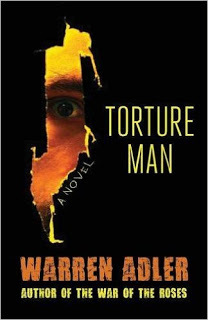 Torture Man
Torture Man
The caller made it clear-$10 million or her daughter's head. The power of unintended consequences sends the privileged life of prominent anti-war activist Sarah Raab crashing down around her. Fear and terror take hold and Sarah turns to former CIA operative Carl Hellmann, a man she has only just met and who stands against everything she has been fighting for.
How could this happen? Why would a terrorist group target her family? Confusion turns to fear and anger as Sarah faces the shocking truth lying beneath the surface of her life. And though Carl's interrogation methods violate everything Sarah believes in, they may be the only way to save her daughter's life.
Faced with horrific choices, Torture Man takes the reader on a torturous weekend where Wall Street kickbacks, deceit, corruption, and jihad collide on the Upper East Side of New York City.
Be sure to visit AMAZON and preorder your copy today!
The Value of My First Creative Writing Course Experience
by Warren Adler @WarrenAdler
 In 1949 when I was twenty-one years old I took a creative writing course at the New School in Manhattan given by Professor Don M. Wolfe. He had been my freshman English teacher at New York University, where I graduated in 1947, just two months shy of my twentieth birthday.
In 1949 when I was twenty-one years old I took a creative writing course at the New School in Manhattan given by Professor Don M. Wolfe. He had been my freshman English teacher at New York University, where I graduated in 1947, just two months shy of my twentieth birthday.
I lived at home in my parents’ Crown Heights apartment in Brooklyn all through college and took the hour-long ten-cent subway ride to the NYU campus in the Bronx, which proved to be an excellent environment for study. Officially I was declared pre-med, although I had absolutely no interest in becoming a doctor, but I had to declare a goal since I was mostly uncertain what career path to follow.
In that fateful freshman year, largely due to Dr. Wolfe’s inspiration (of which he was surely unaware) I decided to be a writer of fiction, changed my major to English literature, gloried in the study of the extraordinary western canon of authors and have since then pursued a lifetime of obsessive composition of novels, short stories, essays and poems through every imaginable phase of rejection, insult, deprecation, praise, acceptance, and a moment or two of lionization.
Bonding In the Class Room
In Dr. Wolfe’s class there were about twenty-five students, of which I was probably the youngest. Many of the men were war veterans and an equal number were women of all ages. Many were not native New Yorkers but had come from all over America to seek writing fame and fortune in what was then the pinnacle of the publishing world.
 As was Dr.Wolfe’s modus operandi, we would submit our short stories and he would read them diligently, covering the manuscripts with his pithy comments in red ink. When he found what he thought was the perfect image, sentence, and thought, he would offer a complimentary acknowledgement.
As was Dr.Wolfe’s modus operandi, we would submit our short stories and he would read them diligently, covering the manuscripts with his pithy comments in red ink. When he found what he thought was the perfect image, sentence, and thought, he would offer a complimentary acknowledgement.
We were all well aware of the common link between us. We were all burning to write what in those days was described as nothing less than The Great American Novel and to savor the fame and fortune that would crown our talents.
One could sense this passion in all of us. It seemed to fill the classroom as if it were part of the oxygen. It was what had brought us together in this rare moment in time under the stewardship of a great, unsung professor who knew that the secret of all fiction writing was to use language to convey and illuminate imagery and meaning, to communicate through a form of artistry that illuminates the truth of the human condition that lies at the heart of all literature.
The craft he taught was more subliminal than merely practical. We had the sense that his critiques were based on the search for truth and honesty wrung out of our deepest need to express the meaning of our own experiences, conflicts, and aspirations. We were constantly creating parallel worlds from our imaginations. For students like us (certainly for most) it appeared to be not a question of choice on our part, but a calling.
One of our fellow students was an older fellow, Harold Applebaum, whose poetry appeared frequently in the New York Times, which in those days published a daily poem. Harold was a brilliant writer who sold candy wholesale to support his growing family. Although he might have cringed at the term, he was also the class literary scout. He chose a number of students from what in retrospect was a tremendously talented group to meet outside of class at our various domiciles to read our latest fictional efforts to each other.
The fact was that bonding with others of like motives was the principal ingredient of the creative writing class experience. We needed this connection to be together both in class and out.
We Had No Problem Being Dreamers
 Convinced that we were all bursting with talent, we were obsessed with our goal to make our bones in the world of literature. Then, unlike now, it was a celebrated, prestigious and golden aspiration. It was, after all, the age of Hemingway, Faulkner, Fitzgerald, O’Hara, Thomas Wolfe, and the great European and English giants.
Convinced that we were all bursting with talent, we were obsessed with our goal to make our bones in the world of literature. Then, unlike now, it was a celebrated, prestigious and golden aspiration. It was, after all, the age of Hemingway, Faulkner, Fitzgerald, O’Hara, Thomas Wolfe, and the great European and English giants.
Five or six of Harold’s handpicked writing stalwarts, myself included, would meet a couple of times a month to read our latest offerings. One of our group was Mario Puzo, then an unpublished novelist in his thirties who had not yet achieved the fame of his novel The Godfather and the movies that followed. Another was John Burress, who had just got a contract for his first novel Little Mule. His novel The Missouri Traveler was made into a movie starring Brandon DeWilde. Among the other writers taking courses concurrent with me at the New School was William Styron who was the first of this group to break out into the literary firmament. Some of the others did achieve publication, although none had the success of Puzo and Styron.
We were, at that stage of our lives, what you would call “wannabe” novelists. The fact that we experienced the sheer joy of bonding with fellow writers continues to make this episode in my life distinctly memorable. There was another creative writing class at the New School of which I was a member and at some point it was decided to publish stories selected from the works of those writers attending classes.
In the two years that I attended Dr. Wolfe’s class, two books were published containing the works of the New School’s creative writing students. The two anthologies published in my time were American Vanguard 1950, and Which Grain Will Grow.
In those books are two of my short stories, “The Other People” and “The Girl in the Polka Dot Dress,” both of which have been republished in my more recent two-volume New York Echoes collection.
Creative Writing is About Camaraderie and the Inspiration That Follows
It is true that creative writing courses cannot teach talent. But depending on the skill and understanding of the teacher, they can foster the kind of camaraderie and inspiration that can light the fire of inherent talent inside you.
The title of our anthology, Which Grain Will Grow, came from Shakespeare’s Macbeth 1, iii: “If you can look into the seeds of time and say which grain will grow and which will not, speak then to me.” In my day, as today, there was no guarantee that participating in a creative writing course would assure future success, or the realization of a student’s writing dreams. My own experience may be peculiar to that special time. But again and again, when I turn back to those moments of encouragement from my teacher and my peers, it never fails to offer a special reset of purpose, a recharging of those long-ago dreams.
TWEETABLES
Great American Novelist, @WarrenAdler shares the value of his first creative #writing course (Click to Tweet)
Creative #writing courses, how one helped launch great american novelist @WarrenAdler (Click to Tweet)
 Warren Adler is best known for The War of the Roses, his masterpiece fictionalization of a macabre divorce turned into the Golden Globe and BAFTA nominated dark comedy hit starring Michael Douglas, Kathleen Turner and Danny DeVito. Adler's international hit stage adaptation of the novel will premiere on Broadway in 2015-2016. Adler has also optioned and sold film rights for a number of his works including Random Hearts (starring Harrison Ford and Kristen Scott Thomas) and The Sunset Gang (produced by Linda Lavin for PBS' American Playhouse series starring Jerry Stiller, Uta Hagen, Harold Gould and Doris Roberts). In recent development are the Broadway Production of The War of the Roses, to be produced by Jay and Cindy Gutterman, The War of the Roses - The Children (Grey Eagle Films and Permut Presentations), a feature film adaptation of the sequel to Adler's iconic divorce story, Target Churchill (Grey Eagle Films and Solution Entertainment),Mourning Glory, to be adapted by Karen Leigh Hopkins, and Capitol Crimes (Grey Eagle Films and Sennet Entertainment), a television series based on his Fiona Fitzgerald mystery series. Warren Adler's newest thriller, Treadmill, is officially available.
Warren Adler is best known for The War of the Roses, his masterpiece fictionalization of a macabre divorce turned into the Golden Globe and BAFTA nominated dark comedy hit starring Michael Douglas, Kathleen Turner and Danny DeVito. Adler's international hit stage adaptation of the novel will premiere on Broadway in 2015-2016. Adler has also optioned and sold film rights for a number of his works including Random Hearts (starring Harrison Ford and Kristen Scott Thomas) and The Sunset Gang (produced by Linda Lavin for PBS' American Playhouse series starring Jerry Stiller, Uta Hagen, Harold Gould and Doris Roberts). In recent development are the Broadway Production of The War of the Roses, to be produced by Jay and Cindy Gutterman, The War of the Roses - The Children (Grey Eagle Films and Permut Presentations), a feature film adaptation of the sequel to Adler's iconic divorce story, Target Churchill (Grey Eagle Films and Solution Entertainment),Mourning Glory, to be adapted by Karen Leigh Hopkins, and Capitol Crimes (Grey Eagle Films and Sennet Entertainment), a television series based on his Fiona Fitzgerald mystery series. Warren Adler's newest thriller, Treadmill, is officially available.
 Torture Man
Torture Man
The caller made it clear-$10 million or her daughter's head. The power of unintended consequences sends the privileged life of prominent anti-war activist Sarah Raab crashing down around her. Fear and terror take hold and Sarah turns to former CIA operative Carl Hellmann, a man she has only just met and who stands against everything she has been fighting for.
How could this happen? Why would a terrorist group target her family? Confusion turns to fear and anger as Sarah faces the shocking truth lying beneath the surface of her life. And though Carl's interrogation methods violate everything Sarah believes in, they may be the only way to save her daughter's life.
Faced with horrific choices, Torture Man takes the reader on a torturous weekend where Wall Street kickbacks, deceit, corruption, and jihad collide on the Upper East Side of New York City.
Be sure to visit AMAZON and preorder your copy today!
The Value of My First Creative Writing Course Experience
by Warren Adler @WarrenAdler
 In 1949 when I was twenty-one years old I took a creative writing course at the New School in Manhattan given by Professor Don M. Wolfe. He had been my freshman English teacher at New York University, where I graduated in 1947, just two months shy of my twentieth birthday.
In 1949 when I was twenty-one years old I took a creative writing course at the New School in Manhattan given by Professor Don M. Wolfe. He had been my freshman English teacher at New York University, where I graduated in 1947, just two months shy of my twentieth birthday.I lived at home in my parents’ Crown Heights apartment in Brooklyn all through college and took the hour-long ten-cent subway ride to the NYU campus in the Bronx, which proved to be an excellent environment for study. Officially I was declared pre-med, although I had absolutely no interest in becoming a doctor, but I had to declare a goal since I was mostly uncertain what career path to follow.
In that fateful freshman year, largely due to Dr. Wolfe’s inspiration (of which he was surely unaware) I decided to be a writer of fiction, changed my major to English literature, gloried in the study of the extraordinary western canon of authors and have since then pursued a lifetime of obsessive composition of novels, short stories, essays and poems through every imaginable phase of rejection, insult, deprecation, praise, acceptance, and a moment or two of lionization.
Bonding In the Class Room
In Dr. Wolfe’s class there were about twenty-five students, of which I was probably the youngest. Many of the men were war veterans and an equal number were women of all ages. Many were not native New Yorkers but had come from all over America to seek writing fame and fortune in what was then the pinnacle of the publishing world.
 As was Dr.Wolfe’s modus operandi, we would submit our short stories and he would read them diligently, covering the manuscripts with his pithy comments in red ink. When he found what he thought was the perfect image, sentence, and thought, he would offer a complimentary acknowledgement.
As was Dr.Wolfe’s modus operandi, we would submit our short stories and he would read them diligently, covering the manuscripts with his pithy comments in red ink. When he found what he thought was the perfect image, sentence, and thought, he would offer a complimentary acknowledgement.We were all well aware of the common link between us. We were all burning to write what in those days was described as nothing less than The Great American Novel and to savor the fame and fortune that would crown our talents.
One could sense this passion in all of us. It seemed to fill the classroom as if it were part of the oxygen. It was what had brought us together in this rare moment in time under the stewardship of a great, unsung professor who knew that the secret of all fiction writing was to use language to convey and illuminate imagery and meaning, to communicate through a form of artistry that illuminates the truth of the human condition that lies at the heart of all literature.
The craft he taught was more subliminal than merely practical. We had the sense that his critiques were based on the search for truth and honesty wrung out of our deepest need to express the meaning of our own experiences, conflicts, and aspirations. We were constantly creating parallel worlds from our imaginations. For students like us (certainly for most) it appeared to be not a question of choice on our part, but a calling.
One of our fellow students was an older fellow, Harold Applebaum, whose poetry appeared frequently in the New York Times, which in those days published a daily poem. Harold was a brilliant writer who sold candy wholesale to support his growing family. Although he might have cringed at the term, he was also the class literary scout. He chose a number of students from what in retrospect was a tremendously talented group to meet outside of class at our various domiciles to read our latest fictional efforts to each other.
The fact was that bonding with others of like motives was the principal ingredient of the creative writing class experience. We needed this connection to be together both in class and out.
We Had No Problem Being Dreamers
 Convinced that we were all bursting with talent, we were obsessed with our goal to make our bones in the world of literature. Then, unlike now, it was a celebrated, prestigious and golden aspiration. It was, after all, the age of Hemingway, Faulkner, Fitzgerald, O’Hara, Thomas Wolfe, and the great European and English giants.
Convinced that we were all bursting with talent, we were obsessed with our goal to make our bones in the world of literature. Then, unlike now, it was a celebrated, prestigious and golden aspiration. It was, after all, the age of Hemingway, Faulkner, Fitzgerald, O’Hara, Thomas Wolfe, and the great European and English giants.Five or six of Harold’s handpicked writing stalwarts, myself included, would meet a couple of times a month to read our latest offerings. One of our group was Mario Puzo, then an unpublished novelist in his thirties who had not yet achieved the fame of his novel The Godfather and the movies that followed. Another was John Burress, who had just got a contract for his first novel Little Mule. His novel The Missouri Traveler was made into a movie starring Brandon DeWilde. Among the other writers taking courses concurrent with me at the New School was William Styron who was the first of this group to break out into the literary firmament. Some of the others did achieve publication, although none had the success of Puzo and Styron.
We were, at that stage of our lives, what you would call “wannabe” novelists. The fact that we experienced the sheer joy of bonding with fellow writers continues to make this episode in my life distinctly memorable. There was another creative writing class at the New School of which I was a member and at some point it was decided to publish stories selected from the works of those writers attending classes.
In the two years that I attended Dr. Wolfe’s class, two books were published containing the works of the New School’s creative writing students. The two anthologies published in my time were American Vanguard 1950, and Which Grain Will Grow.
In those books are two of my short stories, “The Other People” and “The Girl in the Polka Dot Dress,” both of which have been republished in my more recent two-volume New York Echoes collection.
Creative Writing is About Camaraderie and the Inspiration That Follows
It is true that creative writing courses cannot teach talent. But depending on the skill and understanding of the teacher, they can foster the kind of camaraderie and inspiration that can light the fire of inherent talent inside you.
The title of our anthology, Which Grain Will Grow, came from Shakespeare’s Macbeth 1, iii: “If you can look into the seeds of time and say which grain will grow and which will not, speak then to me.” In my day, as today, there was no guarantee that participating in a creative writing course would assure future success, or the realization of a student’s writing dreams. My own experience may be peculiar to that special time. But again and again, when I turn back to those moments of encouragement from my teacher and my peers, it never fails to offer a special reset of purpose, a recharging of those long-ago dreams.
TWEETABLES
Great American Novelist, @WarrenAdler shares the value of his first creative #writing course (Click to Tweet)
Creative #writing courses, how one helped launch great american novelist @WarrenAdler (Click to Tweet)
 Warren Adler is best known for The War of the Roses, his masterpiece fictionalization of a macabre divorce turned into the Golden Globe and BAFTA nominated dark comedy hit starring Michael Douglas, Kathleen Turner and Danny DeVito. Adler's international hit stage adaptation of the novel will premiere on Broadway in 2015-2016. Adler has also optioned and sold film rights for a number of his works including Random Hearts (starring Harrison Ford and Kristen Scott Thomas) and The Sunset Gang (produced by Linda Lavin for PBS' American Playhouse series starring Jerry Stiller, Uta Hagen, Harold Gould and Doris Roberts). In recent development are the Broadway Production of The War of the Roses, to be produced by Jay and Cindy Gutterman, The War of the Roses - The Children (Grey Eagle Films and Permut Presentations), a feature film adaptation of the sequel to Adler's iconic divorce story, Target Churchill (Grey Eagle Films and Solution Entertainment),Mourning Glory, to be adapted by Karen Leigh Hopkins, and Capitol Crimes (Grey Eagle Films and Sennet Entertainment), a television series based on his Fiona Fitzgerald mystery series. Warren Adler's newest thriller, Treadmill, is officially available.
Warren Adler is best known for The War of the Roses, his masterpiece fictionalization of a macabre divorce turned into the Golden Globe and BAFTA nominated dark comedy hit starring Michael Douglas, Kathleen Turner and Danny DeVito. Adler's international hit stage adaptation of the novel will premiere on Broadway in 2015-2016. Adler has also optioned and sold film rights for a number of his works including Random Hearts (starring Harrison Ford and Kristen Scott Thomas) and The Sunset Gang (produced by Linda Lavin for PBS' American Playhouse series starring Jerry Stiller, Uta Hagen, Harold Gould and Doris Roberts). In recent development are the Broadway Production of The War of the Roses, to be produced by Jay and Cindy Gutterman, The War of the Roses - The Children (Grey Eagle Films and Permut Presentations), a feature film adaptation of the sequel to Adler's iconic divorce story, Target Churchill (Grey Eagle Films and Solution Entertainment),Mourning Glory, to be adapted by Karen Leigh Hopkins, and Capitol Crimes (Grey Eagle Films and Sennet Entertainment), a television series based on his Fiona Fitzgerald mystery series. Warren Adler's newest thriller, Treadmill, is officially available.
Published on August 13, 2015 01:00
August 12, 2015
Publishing As a Second Language—How do I Go About Writing on Assignment?
by Linda Gilden @LindaGilden
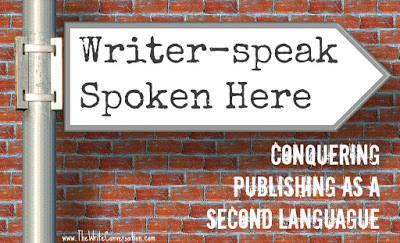 As a new writer I remember hearing seasoned writers talk about writing assignments and wondering How do you ever get to that point? The short answer is lots of hard work! But if you are one of those writers who would love to have editors calling or emailing you with an assignment, let’s talk about how to get there.First of all, what exactly does it mean to write on assignment?Writing on assignment is pretty clear. You are writing an article or book that the editor or publisher has asked you to write. He or she has assigned that project to you, has given you a specific slant, word count, and deadline. All writers hope to someday be able to write on assignment.
As a new writer I remember hearing seasoned writers talk about writing assignments and wondering How do you ever get to that point? The short answer is lots of hard work! But if you are one of those writers who would love to have editors calling or emailing you with an assignment, let’s talk about how to get there.First of all, what exactly does it mean to write on assignment?Writing on assignment is pretty clear. You are writing an article or book that the editor or publisher has asked you to write. He or she has assigned that project to you, has given you a specific slant, word count, and deadline. All writers hope to someday be able to write on assignment.
 So, how do you do that? 1. Perfect your writing style. Learn the craft of writing and how to do it with excellence. Editors appreciate and remember writers who always send material that does not need a lot of editing and turn their writing in on time.
So, how do you do that? 1. Perfect your writing style. Learn the craft of writing and how to do it with excellence. Editors appreciate and remember writers who always send material that does not need a lot of editing and turn their writing in on time.
2. Submit regularly. Editors need to know you are capable of writing well and meeting deadlines. When they see you are submitting regularly, they know you can do that. Pitching often to the same publication will give editors the opportunity to get to know you and your work.
3. Build relationships with those in the publishing business. At my first writers conference I met the editor of a devotional magazine. After a few conversations he asked, “Would you like an assignment for a week of devotions?” Scared me to death but I knew this was a big step in the direction of where I wanted to be as a writer. So I immediately said an enthusiastic, “Yes!” This was a great learning experience and the first of many such assignments. But it wouldn’t have happened if I hadn’t met the editor and spent some time getting to know him and his publication.
4. Keep your eyes and ears open. Article assignments can turn up in the strangest places.You can search the internet and job boards to find writing opportunities.One of the most interesting ways I found an assignment was from my washing machine repairman. He had fixed a washing machine the day before for a person who made a great feature story.Look at magazine theme lists. Is there something there that interests you?Talk to other writers who write regularly.
 Many writers think if you don’t have connections there is no way to generate assignments. But looking regularly at theme lists, job boards, and talking to other writers will get you quickly on the right path. As you establish yourself as a good and dependable writer with a specialty in a few areas, you will come to mind as editors search for writers to cover specific topics.
Many writers think if you don’t have connections there is no way to generate assignments. But looking regularly at theme lists, job boards, and talking to other writers will get you quickly on the right path. As you establish yourself as a good and dependable writer with a specialty in a few areas, you will come to mind as editors search for writers to cover specific topics.
Until you find yourself receiving regular assignments, why not give yourself an assignment or two. Decide on a subject, find a magazine that needs your information (be sure to study their guidelines), then put your deadline on the calendar. It won’t be long before editors will be giving you theirdeadlines to add to the calendar!
What experience do you have with writing on assignment? Share your tips and comments in the section below.
And don't forget to join the conversation!
TWEETABLESHow to Go About #Writing on Assignment - tips from @LindaGilden on @EdieMelson (Click to Tweet)
Publishing as a Second Language - What about #Writing on Assignment?@LindaGilden (Click to Tweet)
 Linda Gilden is a wife, mother, and grandmother. She finds great joy (and excellent writing material) in time spent with her family. Her favorite activity is floating in a pool with a good book surrounded by splashing children!
Linda Gilden is a wife, mother, and grandmother. She finds great joy (and excellent writing material) in time spent with her family. Her favorite activity is floating in a pool with a good book surrounded by splashing children!
To find out more about Linda, her writing, and her ministry, visit www.lindagilden.com . You can also connect with her on Twitter @LindaGilden and Facebook at Author Linda Gilden.
 As a new writer I remember hearing seasoned writers talk about writing assignments and wondering How do you ever get to that point? The short answer is lots of hard work! But if you are one of those writers who would love to have editors calling or emailing you with an assignment, let’s talk about how to get there.First of all, what exactly does it mean to write on assignment?Writing on assignment is pretty clear. You are writing an article or book that the editor or publisher has asked you to write. He or she has assigned that project to you, has given you a specific slant, word count, and deadline. All writers hope to someday be able to write on assignment.
As a new writer I remember hearing seasoned writers talk about writing assignments and wondering How do you ever get to that point? The short answer is lots of hard work! But if you are one of those writers who would love to have editors calling or emailing you with an assignment, let’s talk about how to get there.First of all, what exactly does it mean to write on assignment?Writing on assignment is pretty clear. You are writing an article or book that the editor or publisher has asked you to write. He or she has assigned that project to you, has given you a specific slant, word count, and deadline. All writers hope to someday be able to write on assignment. So, how do you do that? 1. Perfect your writing style. Learn the craft of writing and how to do it with excellence. Editors appreciate and remember writers who always send material that does not need a lot of editing and turn their writing in on time.
So, how do you do that? 1. Perfect your writing style. Learn the craft of writing and how to do it with excellence. Editors appreciate and remember writers who always send material that does not need a lot of editing and turn their writing in on time.2. Submit regularly. Editors need to know you are capable of writing well and meeting deadlines. When they see you are submitting regularly, they know you can do that. Pitching often to the same publication will give editors the opportunity to get to know you and your work.
3. Build relationships with those in the publishing business. At my first writers conference I met the editor of a devotional magazine. After a few conversations he asked, “Would you like an assignment for a week of devotions?” Scared me to death but I knew this was a big step in the direction of where I wanted to be as a writer. So I immediately said an enthusiastic, “Yes!” This was a great learning experience and the first of many such assignments. But it wouldn’t have happened if I hadn’t met the editor and spent some time getting to know him and his publication.
4. Keep your eyes and ears open. Article assignments can turn up in the strangest places.You can search the internet and job boards to find writing opportunities.One of the most interesting ways I found an assignment was from my washing machine repairman. He had fixed a washing machine the day before for a person who made a great feature story.Look at magazine theme lists. Is there something there that interests you?Talk to other writers who write regularly.
 Many writers think if you don’t have connections there is no way to generate assignments. But looking regularly at theme lists, job boards, and talking to other writers will get you quickly on the right path. As you establish yourself as a good and dependable writer with a specialty in a few areas, you will come to mind as editors search for writers to cover specific topics.
Many writers think if you don’t have connections there is no way to generate assignments. But looking regularly at theme lists, job boards, and talking to other writers will get you quickly on the right path. As you establish yourself as a good and dependable writer with a specialty in a few areas, you will come to mind as editors search for writers to cover specific topics.Until you find yourself receiving regular assignments, why not give yourself an assignment or two. Decide on a subject, find a magazine that needs your information (be sure to study their guidelines), then put your deadline on the calendar. It won’t be long before editors will be giving you theirdeadlines to add to the calendar!
What experience do you have with writing on assignment? Share your tips and comments in the section below.
And don't forget to join the conversation!
TWEETABLESHow to Go About #Writing on Assignment - tips from @LindaGilden on @EdieMelson (Click to Tweet)
Publishing as a Second Language - What about #Writing on Assignment?@LindaGilden (Click to Tweet)
 Linda Gilden is a wife, mother, and grandmother. She finds great joy (and excellent writing material) in time spent with her family. Her favorite activity is floating in a pool with a good book surrounded by splashing children!
Linda Gilden is a wife, mother, and grandmother. She finds great joy (and excellent writing material) in time spent with her family. Her favorite activity is floating in a pool with a good book surrounded by splashing children!To find out more about Linda, her writing, and her ministry, visit www.lindagilden.com . You can also connect with her on Twitter @LindaGilden and Facebook at Author Linda Gilden.
Published on August 12, 2015 01:00
August 11, 2015
It's the Author's Responsibility to Keep Readers Reading
by Cindy Sproles @CindyDevoted
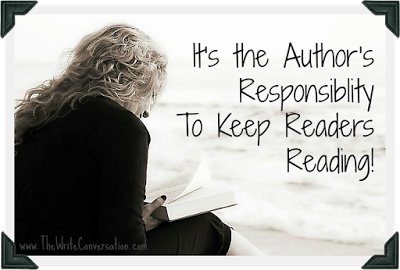 J. R. Ewing heard a noise outside his office door. He walked into the hallway and BOOM! Shot. Twice. This was the season ender for the 1980 television show, Dallas. America was taken back when they realized they were left without the answers to two questions: Was J. R. Ewing dead? Who shot him?
J. R. Ewing heard a noise outside his office door. He walked into the hallway and BOOM! Shot. Twice. This was the season ender for the 1980 television show, Dallas. America was taken back when they realized they were left without the answers to two questions: Was J. R. Ewing dead? Who shot him?
That closing scene was every writers dream come true . . . having the viewer/reader hungry for more.
Fiction is the most read genre in the country. Not only do authors vie for a spot on the fiction shelves of a bookstore, bigger yet, they vie for the reader’s attention. Thanks to the world of technology and media bumping up a viewer’s expectations, writers must step up the pace to draw the reader in.The Writer’s ResponsibilityGone are the days of fluff–setting a lovely, soft scene for the opening paragraph. Today, readers thumb through a book and count the pages in the first few chapters. Readers no longer care how many chapters a book has, as long as they can read them quickly.
 It’s our job to hone the craft, unleashing the creativity that lays beneath the surface. Current day readers demand more of the stories they read and we are forced to give them what they want. Otherwise, they choose the theatre over a good book.
It’s our job to hone the craft, unleashing the creativity that lays beneath the surface. Current day readers demand more of the stories they read and we are forced to give them what they want. Otherwise, they choose the theatre over a good book.
Now, more than ever, the responsibility of the writer becomes grittier, and we are forced to offer the reader a more vivid reading experience by tapping into the depths of their emotion. Dinging the senses of the reader causes them to invest deeper into the story and become emotionally involved.
THE HOOK There was a time when the hook could be anywhere on the first page. Not anymore. Stretch your imagination and get that hook in the first paragraph. If you want to really wow the reader . . . the first line.
There was a time when the hook could be anywhere on the first page. Not anymore. Stretch your imagination and get that hook in the first paragraph. If you want to really wow the reader . . . the first line.
Readers today want instant gratification, a sudden jolt into the movement and pace of the work. The hook should be so powerful and engaging, that the reader asks the question, “What is going on here?” The writers hand should be so strong that it stretches out of the first paragraph wrapping its fingers around the neck of the reader, yanking them head first into a fictional bubble they have no desire to leave.
THE FICTIONAL BUBBLEBuilding the fictional bubble remains an important writing staple. It’s creating a world that draws your reader in and allows them to shut out the reality around them. The fictional bubble is where the reader escapes to relish and savor the story they are seeing unfold.
 So how do we build a stronger fictional bubble? Research. Do your homework. Know the subject you are writing about. The greater your knowledge on the subject you write about, the deeper you can draw the reader in with unique literary description and detail. It means you, the writer become a great liar, spinning a story of twists and turns, only dropping in enough untruth, to make the reader question. The instant your description becomes cliché, pushes too far, or turns inaccurate . . . the second your reader knows more than you . . . the fictional bubble pops and you lose the reader. Creating this bubble that manipulates your reader and drives the story ahead is a tough job. No one ever said writing was easy. It’s filled with reader expectation and if you let them down, take them from their bubble, your readers are disappointed.
So how do we build a stronger fictional bubble? Research. Do your homework. Know the subject you are writing about. The greater your knowledge on the subject you write about, the deeper you can draw the reader in with unique literary description and detail. It means you, the writer become a great liar, spinning a story of twists and turns, only dropping in enough untruth, to make the reader question. The instant your description becomes cliché, pushes too far, or turns inaccurate . . . the second your reader knows more than you . . . the fictional bubble pops and you lose the reader. Creating this bubble that manipulates your reader and drives the story ahead is a tough job. No one ever said writing was easy. It’s filled with reader expectation and if you let them down, take them from their bubble, your readers are disappointed.
THE CLIFFHANGEREnding every chapter with a cliffhanger drives the reader into a “can’t put it down” mode. It’s important to understand cliffhangers are not always action packed. They can simply leave the reader mid-stream of a thought.
The lights in the theatre dimmed. He was three rows in front me. And I needed to ask him a question.
Something this simple strikes the reader’s curiosity and forces their desire to know. Action or disaster at the end of each chapter isn’t always necessary to keep readers guessing. Sometimes it’s just a question. The point is to end every chapter with a line that catapults the reader forward.
It’s up to the writer to stretch and hone their skill in order to keep them reading. When you make the effort to step up the pace of your writing, your stories will have meat on the bones and your readers will no longer be “just readers.” They will be fans.
How do you keep readers reading? Be sure to share your own tips in the comments section below!
TWEETABLESTips for Writers: How to Keep them Reading - @CindyDevoted on @EdieMelson (Click to Tweet)
It's our responsibility as authors to keep readers reading - @CindyDevoted on @EdieMelson (Click to Tweet)
 Cindy Sproles is an author and popular speaker. She is the cofounder of Christian Devotions ministries and managing editor of Straight Street Books and SonRise Devotionals, imprints of Lighthouse Publishing of the Carolinas. Cindy is the executive editor of www.christiandevotions.us and www.inspireafire.com. She teaches at writers conferences nationwide and directs The Asheville Christian Writers Conference - Writers Boot Camp.
Cindy Sproles is an author and popular speaker. She is the cofounder of Christian Devotions ministries and managing editor of Straight Street Books and SonRise Devotionals, imprints of Lighthouse Publishing of the Carolinas. Cindy is the executive editor of www.christiandevotions.us and www.inspireafire.com. She teaches at writers conferences nationwide and directs The Asheville Christian Writers Conference - Writers Boot Camp.
She is the author of two devotionals, He Said, She Said - Learning to Live a Life of Passion and New Sheets - Thirty Days to Refine You into the Woman You Can Be. Cindy's debut novel, Mercy's Rain, is available at major retailers. Visit Cindy at www.cindysproles.com and book her for your next conference or ladies retreat. Also connect with her on Facebook and Twitter.
 J. R. Ewing heard a noise outside his office door. He walked into the hallway and BOOM! Shot. Twice. This was the season ender for the 1980 television show, Dallas. America was taken back when they realized they were left without the answers to two questions: Was J. R. Ewing dead? Who shot him?
J. R. Ewing heard a noise outside his office door. He walked into the hallway and BOOM! Shot. Twice. This was the season ender for the 1980 television show, Dallas. America was taken back when they realized they were left without the answers to two questions: Was J. R. Ewing dead? Who shot him?That closing scene was every writers dream come true . . . having the viewer/reader hungry for more.
Fiction is the most read genre in the country. Not only do authors vie for a spot on the fiction shelves of a bookstore, bigger yet, they vie for the reader’s attention. Thanks to the world of technology and media bumping up a viewer’s expectations, writers must step up the pace to draw the reader in.The Writer’s ResponsibilityGone are the days of fluff–setting a lovely, soft scene for the opening paragraph. Today, readers thumb through a book and count the pages in the first few chapters. Readers no longer care how many chapters a book has, as long as they can read them quickly.
 It’s our job to hone the craft, unleashing the creativity that lays beneath the surface. Current day readers demand more of the stories they read and we are forced to give them what they want. Otherwise, they choose the theatre over a good book.
It’s our job to hone the craft, unleashing the creativity that lays beneath the surface. Current day readers demand more of the stories they read and we are forced to give them what they want. Otherwise, they choose the theatre over a good book.Now, more than ever, the responsibility of the writer becomes grittier, and we are forced to offer the reader a more vivid reading experience by tapping into the depths of their emotion. Dinging the senses of the reader causes them to invest deeper into the story and become emotionally involved.
THE HOOK
 There was a time when the hook could be anywhere on the first page. Not anymore. Stretch your imagination and get that hook in the first paragraph. If you want to really wow the reader . . . the first line.
There was a time when the hook could be anywhere on the first page. Not anymore. Stretch your imagination and get that hook in the first paragraph. If you want to really wow the reader . . . the first line. Readers today want instant gratification, a sudden jolt into the movement and pace of the work. The hook should be so powerful and engaging, that the reader asks the question, “What is going on here?” The writers hand should be so strong that it stretches out of the first paragraph wrapping its fingers around the neck of the reader, yanking them head first into a fictional bubble they have no desire to leave.
THE FICTIONAL BUBBLEBuilding the fictional bubble remains an important writing staple. It’s creating a world that draws your reader in and allows them to shut out the reality around them. The fictional bubble is where the reader escapes to relish and savor the story they are seeing unfold.
 So how do we build a stronger fictional bubble? Research. Do your homework. Know the subject you are writing about. The greater your knowledge on the subject you write about, the deeper you can draw the reader in with unique literary description and detail. It means you, the writer become a great liar, spinning a story of twists and turns, only dropping in enough untruth, to make the reader question. The instant your description becomes cliché, pushes too far, or turns inaccurate . . . the second your reader knows more than you . . . the fictional bubble pops and you lose the reader. Creating this bubble that manipulates your reader and drives the story ahead is a tough job. No one ever said writing was easy. It’s filled with reader expectation and if you let them down, take them from their bubble, your readers are disappointed.
So how do we build a stronger fictional bubble? Research. Do your homework. Know the subject you are writing about. The greater your knowledge on the subject you write about, the deeper you can draw the reader in with unique literary description and detail. It means you, the writer become a great liar, spinning a story of twists and turns, only dropping in enough untruth, to make the reader question. The instant your description becomes cliché, pushes too far, or turns inaccurate . . . the second your reader knows more than you . . . the fictional bubble pops and you lose the reader. Creating this bubble that manipulates your reader and drives the story ahead is a tough job. No one ever said writing was easy. It’s filled with reader expectation and if you let them down, take them from their bubble, your readers are disappointed.THE CLIFFHANGEREnding every chapter with a cliffhanger drives the reader into a “can’t put it down” mode. It’s important to understand cliffhangers are not always action packed. They can simply leave the reader mid-stream of a thought.
The lights in the theatre dimmed. He was three rows in front me. And I needed to ask him a question.
Something this simple strikes the reader’s curiosity and forces their desire to know. Action or disaster at the end of each chapter isn’t always necessary to keep readers guessing. Sometimes it’s just a question. The point is to end every chapter with a line that catapults the reader forward.
It’s up to the writer to stretch and hone their skill in order to keep them reading. When you make the effort to step up the pace of your writing, your stories will have meat on the bones and your readers will no longer be “just readers.” They will be fans.
How do you keep readers reading? Be sure to share your own tips in the comments section below!
TWEETABLESTips for Writers: How to Keep them Reading - @CindyDevoted on @EdieMelson (Click to Tweet)
It's our responsibility as authors to keep readers reading - @CindyDevoted on @EdieMelson (Click to Tweet)
 Cindy Sproles is an author and popular speaker. She is the cofounder of Christian Devotions ministries and managing editor of Straight Street Books and SonRise Devotionals, imprints of Lighthouse Publishing of the Carolinas. Cindy is the executive editor of www.christiandevotions.us and www.inspireafire.com. She teaches at writers conferences nationwide and directs The Asheville Christian Writers Conference - Writers Boot Camp.
Cindy Sproles is an author and popular speaker. She is the cofounder of Christian Devotions ministries and managing editor of Straight Street Books and SonRise Devotionals, imprints of Lighthouse Publishing of the Carolinas. Cindy is the executive editor of www.christiandevotions.us and www.inspireafire.com. She teaches at writers conferences nationwide and directs The Asheville Christian Writers Conference - Writers Boot Camp. She is the author of two devotionals, He Said, She Said - Learning to Live a Life of Passion and New Sheets - Thirty Days to Refine You into the Woman You Can Be. Cindy's debut novel, Mercy's Rain, is available at major retailers. Visit Cindy at www.cindysproles.com and book her for your next conference or ladies retreat. Also connect with her on Facebook and Twitter.
Published on August 11, 2015 01:00
August 10, 2015
What Do I Say On Social Media? 23 Conversation Starters for Authors
By Edie Melson @EdieMelson
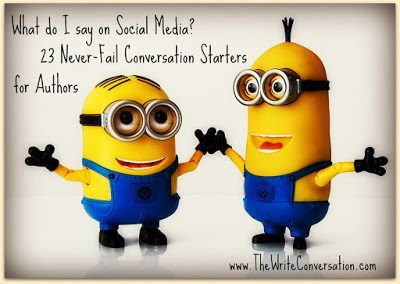 I'm constantly being asked for ideas of what post on social media.
I'm constantly being asked for ideas of what post on social media.
It's important to use those updates as a tool to start a conversation with your friends and followers.
So I've compiled a list of 23 social media conversation starters for Authors. These should help you never be at a loss for words!
23 Social Media Conversation Starters1. Now that hashtags have caught on for a lot of different social media platforms, ask your followers/friends to share their favorite hashtags.
2. Take advantage of the seasons and ask, "What are you reading this summer (fall, spring, winter, etc)."
 Look no farther than the calendar for update inspiration.3. Along the lines of following the calendar, get more specific. For example today is Lazy Day, World Lion Day, National Duran Duran Day, Skyscraper Appreciation Day, and National S’mores Day. It’s also National Smile week—just think the social media updates you can create around those! I post the days for the month to come on the last Thursday of each month. Here's a link to August Calendar Days. You can also post questions about what week this is, and what month.
Look no farther than the calendar for update inspiration.3. Along the lines of following the calendar, get more specific. For example today is Lazy Day, World Lion Day, National Duran Duran Day, Skyscraper Appreciation Day, and National S’mores Day. It’s also National Smile week—just think the social media updates you can create around those! I post the days for the month to come on the last Thursday of each month. Here's a link to August Calendar Days. You can also post questions about what week this is, and what month.
4. Share a new author you've discovered, and invite your followers/friends to do the same. The author doesn't have to be brand new—just new to you.
5. Post a cliche you hate to hear and ask others to post ones that irritate them.
6. One of my most popular social media updates was when I asked for favorite writing quotes. You can do an infinite variation on this by asking for quotes about love, family, mothers . . . you get the idea.
 Share your favorite music to write by.7. Share your favorite music to play while you're writing.
Or even better, share a Spotify playlist.
Share your favorite music to write by.7. Share your favorite music to play while you're writing.
Or even better, share a Spotify playlist.
8. Ask for recommendations for new movies.
9. We all grew up rolling our eyes (maybe only mentally) when mom came out with one of her sayings. Post one of your least favorites, and ask your followers to chime in with one of theirs. 10. In this day of smart phones and tablets, ask for app recommendations. People are always happy to share new things that help make life simpler.
11. Ask for help with your current writing project—such as naming a character or helping refine a non-fiction topic.
 Share an image that inspires you.12. Images are hugely popular, share one that inspires you.
Share an image that inspires you.12. Images are hugely popular, share one that inspires you.
13. Do a new take on What I Did Last Summer, and post what you did this summer, or fall, or last weekend.
14. If you like to cook (or even if you don’t) share a recipe that you love or one you want to try.
15. Make a list and share your favorite people to follow on that specific social media network. For example, a list of favorite Instagram or Twitter accounts.
16. Share something from your bucket list, and ask for your followers to share something on theirs.
17. Post a funny video and ask others to comment or post one they love.
18. Put together a nonsensical list—like your favorite Dr. Seuss words or funniest oxymorons—and ask your followers to add to the list.
19. Post the link to a devotion that inspired you today and ask others to do the same.
20. On TBT (Throwback Thursday) post a picture from your childhood.
 Take a vocabulary test and share the results.21. Take a vocabulary test, share the results and the link and ask others to share their results. Here’s a link to get you started on Test Your Vocal. (And for the record, I scored 36,000 words.)
Take a vocabulary test and share the results.21. Take a vocabulary test, share the results and the link and ask others to share their results. Here’s a link to get you started on Test Your Vocal. (And for the record, I scored 36,000 words.)
22. Ask your followers for ideas of what to share on social media.
23. Post your favorite line from a movie, and ask people to guess which movie it’s associated with.
As you can see, the list could go on and on and on. The key to always having something to say on social media is to keep a list of ideas of what to talk about. Otherwise, if you’re like me, when you’re ready to share something your mind goes blank.
So now it’s your turn. What would you add to my list? Don’t be shy, share your thoughts in the comments section below.
And don’t forget to join the conversation!Blessings,Edie
TWEETABLESWhat to Say On #SocialMedia ? 23 Conversation Starters for Authors from @EdieMelson (Click to Tweet)
Don’t be at a loss for words, 23 #SocialMediaConversation Starters from @EdieMelson (Click to Tweet)
If you've missed the previous posts in this series, here they are:
Part I—Know Where You are and Where You’re GoingPart II—When Should a Writer Start Building a Social Media NetworkPart III—Targeting Millennials: Snapchat’s 3 Most Dominant Brands & Their Tactics Part IV—Dealing with Facebook SpamPart V—How to Use Hashtags in Social Media
Part VI—Is Twitter Worth the Bother?
Part VII—Get Started with Hootsuite
Part VIII—Tips for Composing Effective Social Media Updates
 I'm constantly being asked for ideas of what post on social media.
I'm constantly being asked for ideas of what post on social media. It's important to use those updates as a tool to start a conversation with your friends and followers.
So I've compiled a list of 23 social media conversation starters for Authors. These should help you never be at a loss for words!
23 Social Media Conversation Starters1. Now that hashtags have caught on for a lot of different social media platforms, ask your followers/friends to share their favorite hashtags.
2. Take advantage of the seasons and ask, "What are you reading this summer (fall, spring, winter, etc)."
 Look no farther than the calendar for update inspiration.3. Along the lines of following the calendar, get more specific. For example today is Lazy Day, World Lion Day, National Duran Duran Day, Skyscraper Appreciation Day, and National S’mores Day. It’s also National Smile week—just think the social media updates you can create around those! I post the days for the month to come on the last Thursday of each month. Here's a link to August Calendar Days. You can also post questions about what week this is, and what month.
Look no farther than the calendar for update inspiration.3. Along the lines of following the calendar, get more specific. For example today is Lazy Day, World Lion Day, National Duran Duran Day, Skyscraper Appreciation Day, and National S’mores Day. It’s also National Smile week—just think the social media updates you can create around those! I post the days for the month to come on the last Thursday of each month. Here's a link to August Calendar Days. You can also post questions about what week this is, and what month.
4. Share a new author you've discovered, and invite your followers/friends to do the same. The author doesn't have to be brand new—just new to you.
5. Post a cliche you hate to hear and ask others to post ones that irritate them.
6. One of my most popular social media updates was when I asked for favorite writing quotes. You can do an infinite variation on this by asking for quotes about love, family, mothers . . . you get the idea.
 Share your favorite music to write by.7. Share your favorite music to play while you're writing.
Or even better, share a Spotify playlist.
Share your favorite music to write by.7. Share your favorite music to play while you're writing.
Or even better, share a Spotify playlist. 8. Ask for recommendations for new movies.
9. We all grew up rolling our eyes (maybe only mentally) when mom came out with one of her sayings. Post one of your least favorites, and ask your followers to chime in with one of theirs. 10. In this day of smart phones and tablets, ask for app recommendations. People are always happy to share new things that help make life simpler.
11. Ask for help with your current writing project—such as naming a character or helping refine a non-fiction topic.
 Share an image that inspires you.12. Images are hugely popular, share one that inspires you.
Share an image that inspires you.12. Images are hugely popular, share one that inspires you. 13. Do a new take on What I Did Last Summer, and post what you did this summer, or fall, or last weekend.
14. If you like to cook (or even if you don’t) share a recipe that you love or one you want to try.
15. Make a list and share your favorite people to follow on that specific social media network. For example, a list of favorite Instagram or Twitter accounts.
16. Share something from your bucket list, and ask for your followers to share something on theirs.
17. Post a funny video and ask others to comment or post one they love.
18. Put together a nonsensical list—like your favorite Dr. Seuss words or funniest oxymorons—and ask your followers to add to the list.
19. Post the link to a devotion that inspired you today and ask others to do the same.
20. On TBT (Throwback Thursday) post a picture from your childhood.
 Take a vocabulary test and share the results.21. Take a vocabulary test, share the results and the link and ask others to share their results. Here’s a link to get you started on Test Your Vocal. (And for the record, I scored 36,000 words.)
Take a vocabulary test and share the results.21. Take a vocabulary test, share the results and the link and ask others to share their results. Here’s a link to get you started on Test Your Vocal. (And for the record, I scored 36,000 words.)22. Ask your followers for ideas of what to share on social media.
23. Post your favorite line from a movie, and ask people to guess which movie it’s associated with.
As you can see, the list could go on and on and on. The key to always having something to say on social media is to keep a list of ideas of what to talk about. Otherwise, if you’re like me, when you’re ready to share something your mind goes blank.
So now it’s your turn. What would you add to my list? Don’t be shy, share your thoughts in the comments section below.
And don’t forget to join the conversation!Blessings,Edie
TWEETABLESWhat to Say On #SocialMedia ? 23 Conversation Starters for Authors from @EdieMelson (Click to Tweet)
Don’t be at a loss for words, 23 #SocialMediaConversation Starters from @EdieMelson (Click to Tweet)
If you've missed the previous posts in this series, here they are:
Part I—Know Where You are and Where You’re GoingPart II—When Should a Writer Start Building a Social Media NetworkPart III—Targeting Millennials: Snapchat’s 3 Most Dominant Brands & Their Tactics Part IV—Dealing with Facebook SpamPart V—How to Use Hashtags in Social Media
Part VI—Is Twitter Worth the Bother?
Part VII—Get Started with Hootsuite
Part VIII—Tips for Composing Effective Social Media Updates
Published on August 10, 2015 01:00
August 9, 2015
Perspective for Writers
 by Sarah Van Diest
by Sarah Van Diest“And let us run with perseverance the race marked out for us, fixing our eyes on Jesus, the pioneer and perfecter of faith. For the joy set before him he endured the cross, scorning its shame, and sat down at the right hand of the throne of God. Consider him who endured such opposition from sinners, so that you will not grow weary and lose heart” Hebrews 12:1b-3.
I need You, Father, so very much.
I’m struggling today. In words to a writer friend I wrote, “I think this writer’s-giant-mountain-of-a-wall is going to swallow me whole and eat me alive. That’s all.” Do you know what I’m talking about? I’m paralyzed with words of every size and color shooting through my brain and hitting the canvas of my writing like bugs splattered on the windshield. It’s a gooey, bloody mess.
 I know what I want to say. I want to say that God is good. That He loves us more than we can imagine. That He has a purpose beyond our understanding for the pains we endure, if we will let Him use them. I want to tell you that it helps if our perspective is right. That our loads are lighter if we can see things from a “God’s got this” vantage point. And it’s going to be okay. Really.
I know what I want to say. I want to say that God is good. That He loves us more than we can imagine. That He has a purpose beyond our understanding for the pains we endure, if we will let Him use them. I want to tell you that it helps if our perspective is right. That our loads are lighter if we can see things from a “God’s got this” vantage point. And it’s going to be okay. Really. Victor Frankl wrote: “suffering ceases to be suffering at the moment it finds a meaning…the helpless victim of a hopeless situation, facing a fate he cannot change, may rise above himself, may grow beyond himself, and by so doing change himself. He may turn a personal tragedy in to triumph.” That’s what Hebrews tells us about Jesus and His ordeal on the cross: “For the joy set before him he endured the cross.” It was the anticipation of the blessings to come that the most extreme moment of pain, sadness and sorrow in all of human history was borne.
Perspective and right understanding are key.
I have known the helplessness of a hopeless situation. I have lived in foreign lands amid foreign tongues with foreign faces and foreign ways. I have felt lost and abandoned, alone and frightened. I have felt the cold hand of death reach into my lungs for the last bit of air. I have faced a fate I could not change, and found I had a choice.
Choice means our pain doesn’t have to be empty.
 By the way, some declare pain is the hallmark of God’s absence, that He has left us to suffer alone. Others say the presence of pain reveals a weakness of faith, and condemn us for not trusting God enough. But in this life we will have pain, trouble and sorrow. We will suffer loss. Sometimes this life hurts! The only thing we can say with certainty about pain is that pain indicates we are still alive. Nothing else.
By the way, some declare pain is the hallmark of God’s absence, that He has left us to suffer alone. Others say the presence of pain reveals a weakness of faith, and condemn us for not trusting God enough. But in this life we will have pain, trouble and sorrow. We will suffer loss. Sometimes this life hurts! The only thing we can say with certainty about pain is that pain indicates we are still alive. Nothing else.I knew I had a choice to either trust God or not. And though my concept of God’s overall plan at that time was more limited than it is today, I understood that when I trusted my Heavenly Father, when I believed in His love for me and His sovereignty, it pleased Him. My mind’s eye would picture His smile, like a father holding His child, and it gave me strength. I wanted to see Him smile. I wanted His heart to be filled with joy because He knew His child trusted Him. It didn’t stop the pain or change my circumstances, but it changed me.
What choice did Jesus have on the cross? Of course, because He was/is God, He could have chosen to come down from it, but that was not an option because He had decided to do the Father’s will, so what choice did He have? He had the choice to be the victim or to look ahead to the glory yet to come. Either would have been legitimate choices, but only one was good and only one had imbedded in it the strength He needed to stay on that cross. He chose to scorn the shame of the victim and look ahead to the joy to come.
Part of the lie we believe is that becoming the victim in our hopeless situations will secure our comfort and safety. Somehow we believe that giving weight to our circumstances and allowing them to rule over us will bend them to treat us better. We put our faith in the thing that is hurting us, giving it reign over our lives, and ignore and discount the choice that leads to freedom and hope.
 It really comes down to this: do we believe that with Him we can get through this? Do we believe God’s got this? And I mean that in an overarching kind of way, because I’m not saying trusting God means we won’t lose something or someone we love. We may. Even our very lives may be lost. What I’m saying is that there is an eternal perspective that holds our feet firmly on the foundation of our Father’s faithfulness. He will not leave nor forsake us. He will search for us and find us. He will never abandon us. Never. He will reward those who diligently seek Him. This is our hope and joy set before us.
It really comes down to this: do we believe that with Him we can get through this? Do we believe God’s got this? And I mean that in an overarching kind of way, because I’m not saying trusting God means we won’t lose something or someone we love. We may. Even our very lives may be lost. What I’m saying is that there is an eternal perspective that holds our feet firmly on the foundation of our Father’s faithfulness. He will not leave nor forsake us. He will search for us and find us. He will never abandon us. Never. He will reward those who diligently seek Him. This is our hope and joy set before us.There is no situation where hope is fully gone. A hopeless situation is only hopeless if the choice has been made to ignore hope’s presence. Pain is endured, but a perspective like what Jesus had, and like what Frankl wrote about, gives strength to trust God through it. There is joy to come. There are rewards to be had. There is victory over the enemy. There is life!
So, let us run the race before us, set our eyes on Jesus, on hope, on truth, for there is joy to come!
 Sarah has worked in Christian publishing since 2005 as both and editor and an agent.
Sarah has worked in Christian publishing since 2005 as both and editor and an agent. Currently, she works with her husband, David, in their agency, the Van Diest Literary Agency. Writing is a growing passion for her as she hopes to bring hope to hurting hearts.
Published on August 09, 2015 01:00
August 8, 2015
Is Life a Habit or a Marvel?
by Beth Vogt @BethVogt
 "Life never becomes a habit to me. It's always a marvel." -Katherine MansfieldHabits are highly effective—or so they say.
"Life never becomes a habit to me. It's always a marvel." -Katherine MansfieldHabits are highly effective—or so they say.
But there’s something to be said about allowing life to surprise us. Remembering to be wide-eyed. Taking time to marvel at things around us. Or the people we meet during the day.
I live in Colorado Springs, Colorado. In the midst of running my errands, living my oh-so-daily life — you know, falling into the familiar habit of it all — I can forget to look up and see Pikes Peak rising just beyond the foothills. It’s right there, waiting for me to notice it, every single day.
But I’m so used to Pikes Peak, I forget. It becomes nothing special and fades into the background. Just another mountain. Nothing to marvel at.
Today’s quote made me stop and think:If I had a choice, would I rather live life as a habit or a marvel? I’d pick marvels over habits every time.
It seems as we grow older, life demands that we spend less time marveling — over a rainbow or a hummingbird or the kindness of a friend or the comfort of silence. Instead, to succeed we must work harder to establish habits: being diligent and proactive and good communicators.
And yet, in the pursuit of helpful habits, what if we lose the spark, the wide-eyed wonder, of seeing life for what it is? A gift. A blessing. A reason to be thankful — every day.
In Your Words: If you had a choice, would you rather live life as a habit or a marvel? What marvelous experience — event, person, thing — jolted you out of your ordinary recently?
TWEETABLEDo you approach life as a habit or a marvel? - @BethVogt on @EdieMelson (Click to Tweet)
 Beth K. Vogt believes God’s best often waits behind the doors marked “Never.”
Beth K. Vogt believes God’s best often waits behind the doors marked “Never.”
A nonfiction writer and editor who said she’d never write fiction, Beth is now a novelist with Howard Books. She enjoys writing inspirational contemporary romance because she believes there’s more to happily-ever-after than the fairy tales tell us. Connect with Beth on her website, Twitter, Facebook, or check out her blog on quotes, In Others’ Words.
 "Life never becomes a habit to me. It's always a marvel." -Katherine MansfieldHabits are highly effective—or so they say.
"Life never becomes a habit to me. It's always a marvel." -Katherine MansfieldHabits are highly effective—or so they say.But there’s something to be said about allowing life to surprise us. Remembering to be wide-eyed. Taking time to marvel at things around us. Or the people we meet during the day.
I live in Colorado Springs, Colorado. In the midst of running my errands, living my oh-so-daily life — you know, falling into the familiar habit of it all — I can forget to look up and see Pikes Peak rising just beyond the foothills. It’s right there, waiting for me to notice it, every single day.
But I’m so used to Pikes Peak, I forget. It becomes nothing special and fades into the background. Just another mountain. Nothing to marvel at.
Today’s quote made me stop and think:If I had a choice, would I rather live life as a habit or a marvel? I’d pick marvels over habits every time.
It seems as we grow older, life demands that we spend less time marveling — over a rainbow or a hummingbird or the kindness of a friend or the comfort of silence. Instead, to succeed we must work harder to establish habits: being diligent and proactive and good communicators.
And yet, in the pursuit of helpful habits, what if we lose the spark, the wide-eyed wonder, of seeing life for what it is? A gift. A blessing. A reason to be thankful — every day.
In Your Words: If you had a choice, would you rather live life as a habit or a marvel? What marvelous experience — event, person, thing — jolted you out of your ordinary recently?
TWEETABLEDo you approach life as a habit or a marvel? - @BethVogt on @EdieMelson (Click to Tweet)
 Beth K. Vogt believes God’s best often waits behind the doors marked “Never.”
Beth K. Vogt believes God’s best often waits behind the doors marked “Never.” A nonfiction writer and editor who said she’d never write fiction, Beth is now a novelist with Howard Books. She enjoys writing inspirational contemporary romance because she believes there’s more to happily-ever-after than the fairy tales tell us. Connect with Beth on her website, Twitter, Facebook, or check out her blog on quotes, In Others’ Words.
Published on August 08, 2015 01:00
August 7, 2015
Sacrificial Writing
by Bruce Brady @BDBrady007
 I can’t believe it. The Messiah is in my neighborhood. I’ve got to see what this man looks like. I mean, I’ve heard so much about him, he must be 10 feet tall or something.
I can’t believe it. The Messiah is in my neighborhood. I’ve got to see what this man looks like. I mean, I’ve heard so much about him, he must be 10 feet tall or something.
Oh great. The street is already lined four or five deep with people. And everyone is taller than I am. Even the kids. There must be a way to get at least a glimpse of this man named Jesus.
Wait—I can climb that tree over there.
It’s a good thing the branches start near the ground or I wouldn’t have been able to get up here.
What’s that? You want to have dinner at my house? You don’t know how happy this makes me. Wait ‘til I tell everyone that you will be dining at my house.
Jesus, I want to do whatever is necessary to become your friend. I’ll give half my wealth to the poor. And if anyone thinks I’ve cheated them, I’ll pay them four times what I took from them. I’m only interested in pleasing you.
Zacchaeus, the man in our story, was so committed to building a relationship with someone that he was willing to sacrifice much to accomplish that goal. His desire to know Jesus became a top priority. As writers, we must prioritize our writing in a similar manner. I’m not saying we should ignore God, our families, or other obligations, but we shouldn’t use them, or anything, as an excuse not to write.
As writers, we must prioritize our writing in a similar manner. I’m not saying we should ignore God, our families, or other obligations, but we shouldn’t use them, or anything, as an excuse not to write.
Ignoring our call or talent will not rest well with our souls. So, we must write. And we must do so on a regular basis. We need to write to improve our skills. We need to write because others need to read or hear our words. Our words are more than just a nice little story or a few educational tidbits. To some, they provide the answers they seek. To others, they’re the escape from reality they need.
Our word crafting is more than just a passing fancy. It’s answering our summons—fulfilling our destinies. If we write only to satisfy ourselves, then our talents may atrophy. When writing to serve others, our talents will grow. And we’ll be richly rewarded, beyond mere monetary compensation.
 If we truly want a career as a writer, then, like our vertically challenged friend above, we must be willing to sacrifice whatever we must to attain that goal. We have to spend time honing our craft when we really want to be doing something else. Improving our skills late at night may become necessary to avoid sacrificing time with our families. Other obligations may necessitate our waking up early to get in our word count for the day.
If we truly want a career as a writer, then, like our vertically challenged friend above, we must be willing to sacrifice whatever we must to attain that goal. We have to spend time honing our craft when we really want to be doing something else. Improving our skills late at night may become necessary to avoid sacrificing time with our families. Other obligations may necessitate our waking up early to get in our word count for the day.
Being a writer isn’t easy. But, if we can’t live without writing, then we must dedicate ourselves to do whatever it takes to get our words in front of others. We must commit ourselves to being the best writers we can be. We must do it for our readers. We must do it for ourselves.
How about you? Please comment on the sacrifices you’ve made for your writing. Let’s keep the conversation going.
TWEETABLESIgnoring our call to #write will not rest well with our souls - @BDBrady007 on @EdieMelson (Click to Tweet)
We must prioritize our #writing - thoughts from @BDBrady007 on @EdieMelson (Click to Tweet)
 Bruce Brady is an author, writer and playwright. His work has appeared in Focus on the Family’s Thriving Family, www.ChristianDevotions.us, and on stage. Currently, Bruce is working on a Young Adult Novel about a boy who must deal with the death of his dad, being bullied, and helping his mom through her grief. His first five pages took third place in the ACFW South Carolina Chapter’s “First Five Pages” contest.
Bruce Brady is an author, writer and playwright. His work has appeared in Focus on the Family’s Thriving Family, www.ChristianDevotions.us, and on stage. Currently, Bruce is working on a Young Adult Novel about a boy who must deal with the death of his dad, being bullied, and helping his mom through her grief. His first five pages took third place in the ACFW South Carolina Chapter’s “First Five Pages” contest.
When he’s not writing, Bruce spends time learning from and helping other writers. He serves as Mentor of Word Weavers International’s Online Chapter, and as a member of Cross ‘N’ Pens, The Writer’s Plot, ACFW’s National and South Carolina Chapters.
“My dream is to entertain my readers and give them hope as they travel the rocky road of life.”
 I can’t believe it. The Messiah is in my neighborhood. I’ve got to see what this man looks like. I mean, I’ve heard so much about him, he must be 10 feet tall or something.
I can’t believe it. The Messiah is in my neighborhood. I’ve got to see what this man looks like. I mean, I’ve heard so much about him, he must be 10 feet tall or something.Oh great. The street is already lined four or five deep with people. And everyone is taller than I am. Even the kids. There must be a way to get at least a glimpse of this man named Jesus.
Wait—I can climb that tree over there.
It’s a good thing the branches start near the ground or I wouldn’t have been able to get up here.
What’s that? You want to have dinner at my house? You don’t know how happy this makes me. Wait ‘til I tell everyone that you will be dining at my house.
Jesus, I want to do whatever is necessary to become your friend. I’ll give half my wealth to the poor. And if anyone thinks I’ve cheated them, I’ll pay them four times what I took from them. I’m only interested in pleasing you.
Zacchaeus, the man in our story, was so committed to building a relationship with someone that he was willing to sacrifice much to accomplish that goal. His desire to know Jesus became a top priority.
 As writers, we must prioritize our writing in a similar manner. I’m not saying we should ignore God, our families, or other obligations, but we shouldn’t use them, or anything, as an excuse not to write.
As writers, we must prioritize our writing in a similar manner. I’m not saying we should ignore God, our families, or other obligations, but we shouldn’t use them, or anything, as an excuse not to write.Ignoring our call or talent will not rest well with our souls. So, we must write. And we must do so on a regular basis. We need to write to improve our skills. We need to write because others need to read or hear our words. Our words are more than just a nice little story or a few educational tidbits. To some, they provide the answers they seek. To others, they’re the escape from reality they need.
Our word crafting is more than just a passing fancy. It’s answering our summons—fulfilling our destinies. If we write only to satisfy ourselves, then our talents may atrophy. When writing to serve others, our talents will grow. And we’ll be richly rewarded, beyond mere monetary compensation.
 If we truly want a career as a writer, then, like our vertically challenged friend above, we must be willing to sacrifice whatever we must to attain that goal. We have to spend time honing our craft when we really want to be doing something else. Improving our skills late at night may become necessary to avoid sacrificing time with our families. Other obligations may necessitate our waking up early to get in our word count for the day.
If we truly want a career as a writer, then, like our vertically challenged friend above, we must be willing to sacrifice whatever we must to attain that goal. We have to spend time honing our craft when we really want to be doing something else. Improving our skills late at night may become necessary to avoid sacrificing time with our families. Other obligations may necessitate our waking up early to get in our word count for the day.Being a writer isn’t easy. But, if we can’t live without writing, then we must dedicate ourselves to do whatever it takes to get our words in front of others. We must commit ourselves to being the best writers we can be. We must do it for our readers. We must do it for ourselves.
How about you? Please comment on the sacrifices you’ve made for your writing. Let’s keep the conversation going.
TWEETABLESIgnoring our call to #write will not rest well with our souls - @BDBrady007 on @EdieMelson (Click to Tweet)
We must prioritize our #writing - thoughts from @BDBrady007 on @EdieMelson (Click to Tweet)
 Bruce Brady is an author, writer and playwright. His work has appeared in Focus on the Family’s Thriving Family, www.ChristianDevotions.us, and on stage. Currently, Bruce is working on a Young Adult Novel about a boy who must deal with the death of his dad, being bullied, and helping his mom through her grief. His first five pages took third place in the ACFW South Carolina Chapter’s “First Five Pages” contest.
Bruce Brady is an author, writer and playwright. His work has appeared in Focus on the Family’s Thriving Family, www.ChristianDevotions.us, and on stage. Currently, Bruce is working on a Young Adult Novel about a boy who must deal with the death of his dad, being bullied, and helping his mom through her grief. His first five pages took third place in the ACFW South Carolina Chapter’s “First Five Pages” contest.When he’s not writing, Bruce spends time learning from and helping other writers. He serves as Mentor of Word Weavers International’s Online Chapter, and as a member of Cross ‘N’ Pens, The Writer’s Plot, ACFW’s National and South Carolina Chapters.
“My dream is to entertain my readers and give them hope as they travel the rocky road of life.”
Published on August 07, 2015 01:00
August 6, 2015
Thursday Review—The One Thing
by Lynn Blackburn @LynnHBlackburn
 I'm wired to be task-oriented.I’m a task-oriented person. It’s how I’m wired.
I'm wired to be task-oriented.I’m a task-oriented person. It’s how I’m wired.
You’d think with that kind of wiring, I’d be churning out books by the dozens.
Not so much.
In fact, I’ve been struggling to figure out how to get this whole writing thing squeezed into my day.I’m a wife, a mom of three, and a published author. And that is how I want my priorities to stay…husband, kids, then books.
Not the other way around.
But…this book business? The storytelling and swooning. It’s not just for kicks and giggles. It’s certainly not for the money.
 "When life crowds out the creating, my calling goes
"When life crowds out the creating, my calling goes
unfulfilled & my spirit shrivels." Lynn H BlackburnWhen life crowds out the creating, my calling goes unfulfilled and my spirit shrivels under the tyranny of the urgent. I do the laundry and cook. I read and clean (not much, but still…) and pay bills.
But when I don’t write, I’m not right.
I’m not fully living as the person God intends for me to be.
But how am I supposed to rightly order my world and priorities (God, family, then fiction) and still get it all done?
I don’t have a perfect answer, but I’m a lot closer to it than I was a few months ago.
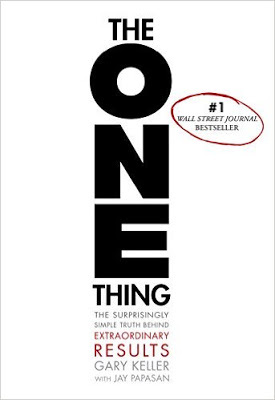 The One ThingI picked up a book called
The One Thing
by Gary Keller with Jay Papasan and I’ve been absorbing and experimenting with the ideas they present in this quick and engaging read.
The One ThingI picked up a book called
The One Thing
by Gary Keller with Jay Papasan and I’ve been absorbing and experimenting with the ideas they present in this quick and engaging read.
Now this book was not specifically written for writers. It is written to apply to your professional life. If you’re a full-time writer, you might be able to apply all these principles. I’m not and I won’t be for a long time, so not everything translates perfectly into my real world.
But way more of it does than doesn’t.
The book is divided into three parts.
Part 1 - The Lies, They Mislead and Derail Us. These “lies” include the idea that everything matters equally (I wanted to highlight most of this chapter), that multitasking is a good idea (so why do we keep trying it), that all we need is more self-discipline to be successful, that we have unlimited willpower, that a balanced life is the ultimate goal and that dreaming big is bad.
Part 2 - The Truth, The Simple Path to Productivity. This section introduces the “focusing question” which can be used to help you find your one thing that you can do that will make everything else easier or unnecessary. The Success Habit takes the focusing question and applies it to all the areas of your life that are important to you - your spiritual life, your business life, your health, your relationships. This has been the biggest game changer for me and is revolutionizing the way I plan my days and weeks. Then it’s time to take the questions you’ve been asking and consider multiple answers until you find the best answer.
Part 3 - Extraordinary Results, Unlocking the Possibilities Within You. This section gets into the nitty-gritty of what this looks like. Again, some of this won’t apply to every aspect of the writer’s unique life. I don’t know very many writers who daily go into the office and work 9-5, but it’s good information regardless.
The book concludes with very practical examples of how to apply the focusing question to work on everything from your marriage to your golf swing.
Keller and Papasan contend that it takes around 66 days to form a habit. I haven’t reached the 66 day mark, but I am seeing this “one thing” mentality beginning to pay dividends in my own world.
As a Christian writer, I’ve taken their advice and instead of just asking myself what my “one thing” is, I’ve asked God to direct me and guide me.
I have no interest in doing it all.
I am very interested in doing the things He wants me to do, and not letting a lot of extraneous tasks get in the way.
Want to give it a try? I’d love to know what you think your “one thing” might be.
Don’t forget to join the conversation!
TWEETABLETHE ONE THING - a book to help #writers (& everyone else) #prioritize life - @LynnHBlackburn (Click to Tweet)
"When I don't write, I'm not right" - via author @LynnHBlackburn on @EdieMelson (Click to Tweet)
 Lynn Huggins Blackburn believes in the power of stories, especially those that remind us that true love exists, a gift from the Truest Love. She’s passionate about CrossFit, coffee, and chocolate (don’t make her choose) and experimenting with recipes that feed both body and soul. She lives in South Carolina with her true love, Brian, and their three children. You can follow her real life happily ever after at http://www.lynnhugginsblackburn.com.
Lynn Huggins Blackburn believes in the power of stories, especially those that remind us that true love exists, a gift from the Truest Love. She’s passionate about CrossFit, coffee, and chocolate (don’t make her choose) and experimenting with recipes that feed both body and soul. She lives in South Carolina with her true love, Brian, and their three children. You can follow her real life happily ever after at http://www.lynnhugginsblackburn.com.
 I'm wired to be task-oriented.I’m a task-oriented person. It’s how I’m wired.
I'm wired to be task-oriented.I’m a task-oriented person. It’s how I’m wired.You’d think with that kind of wiring, I’d be churning out books by the dozens.
Not so much.
In fact, I’ve been struggling to figure out how to get this whole writing thing squeezed into my day.I’m a wife, a mom of three, and a published author. And that is how I want my priorities to stay…husband, kids, then books.
Not the other way around.
But…this book business? The storytelling and swooning. It’s not just for kicks and giggles. It’s certainly not for the money.
 "When life crowds out the creating, my calling goes
"When life crowds out the creating, my calling goesunfulfilled & my spirit shrivels." Lynn H BlackburnWhen life crowds out the creating, my calling goes unfulfilled and my spirit shrivels under the tyranny of the urgent. I do the laundry and cook. I read and clean (not much, but still…) and pay bills.
But when I don’t write, I’m not right.
I’m not fully living as the person God intends for me to be.
But how am I supposed to rightly order my world and priorities (God, family, then fiction) and still get it all done?
I don’t have a perfect answer, but I’m a lot closer to it than I was a few months ago.
 The One ThingI picked up a book called
The One Thing
by Gary Keller with Jay Papasan and I’ve been absorbing and experimenting with the ideas they present in this quick and engaging read.
The One ThingI picked up a book called
The One Thing
by Gary Keller with Jay Papasan and I’ve been absorbing and experimenting with the ideas they present in this quick and engaging read.Now this book was not specifically written for writers. It is written to apply to your professional life. If you’re a full-time writer, you might be able to apply all these principles. I’m not and I won’t be for a long time, so not everything translates perfectly into my real world.
But way more of it does than doesn’t.
The book is divided into three parts.
Part 1 - The Lies, They Mislead and Derail Us. These “lies” include the idea that everything matters equally (I wanted to highlight most of this chapter), that multitasking is a good idea (so why do we keep trying it), that all we need is more self-discipline to be successful, that we have unlimited willpower, that a balanced life is the ultimate goal and that dreaming big is bad.
Part 2 - The Truth, The Simple Path to Productivity. This section introduces the “focusing question” which can be used to help you find your one thing that you can do that will make everything else easier or unnecessary. The Success Habit takes the focusing question and applies it to all the areas of your life that are important to you - your spiritual life, your business life, your health, your relationships. This has been the biggest game changer for me and is revolutionizing the way I plan my days and weeks. Then it’s time to take the questions you’ve been asking and consider multiple answers until you find the best answer.
Part 3 - Extraordinary Results, Unlocking the Possibilities Within You. This section gets into the nitty-gritty of what this looks like. Again, some of this won’t apply to every aspect of the writer’s unique life. I don’t know very many writers who daily go into the office and work 9-5, but it’s good information regardless.
The book concludes with very practical examples of how to apply the focusing question to work on everything from your marriage to your golf swing.
Keller and Papasan contend that it takes around 66 days to form a habit. I haven’t reached the 66 day mark, but I am seeing this “one thing” mentality beginning to pay dividends in my own world.
As a Christian writer, I’ve taken their advice and instead of just asking myself what my “one thing” is, I’ve asked God to direct me and guide me.
I have no interest in doing it all.
I am very interested in doing the things He wants me to do, and not letting a lot of extraneous tasks get in the way.
Want to give it a try? I’d love to know what you think your “one thing” might be.
Don’t forget to join the conversation!
TWEETABLETHE ONE THING - a book to help #writers (& everyone else) #prioritize life - @LynnHBlackburn (Click to Tweet)
"When I don't write, I'm not right" - via author @LynnHBlackburn on @EdieMelson (Click to Tweet)
 Lynn Huggins Blackburn believes in the power of stories, especially those that remind us that true love exists, a gift from the Truest Love. She’s passionate about CrossFit, coffee, and chocolate (don’t make her choose) and experimenting with recipes that feed both body and soul. She lives in South Carolina with her true love, Brian, and their three children. You can follow her real life happily ever after at http://www.lynnhugginsblackburn.com.
Lynn Huggins Blackburn believes in the power of stories, especially those that remind us that true love exists, a gift from the Truest Love. She’s passionate about CrossFit, coffee, and chocolate (don’t make her choose) and experimenting with recipes that feed both body and soul. She lives in South Carolina with her true love, Brian, and their three children. You can follow her real life happily ever after at http://www.lynnhugginsblackburn.com.
Published on August 06, 2015 01:00
August 4, 2015
Organize Your Life as a Writer
by Edie Melson @EdieMelson
 I don’t care if you’re a freelance writer, nonfiction writer, novelists or something of a hybrid. The truth is that you have to wear a lot of hats to find publishing success. You have to be able to write on a deadline, plan marketing campaigns, utilize social media, and of course, write.
I don’t care if you’re a freelance writer, nonfiction writer, novelists or something of a hybrid. The truth is that you have to wear a lot of hats to find publishing success. You have to be able to write on a deadline, plan marketing campaigns, utilize social media, and of course, write.
The increase pressure to do it all has led to frustration and burnout in a lot of writers I come into contact with. But even with the downside, there are those of us to whom writing is like breathing. Without it, we’ll die.
We have come to a point the mad juggling skills are a requirement for today’s writers. But don’t give up hope. There are some things you can do, some ways to organize your time, that will help you accomplish more than you thought. Beyond that, you can make a conscious decision to give yourself a pass on some things.
Here are some tips that keep me sane: Make a list. Now I have to confess, I’m not a rabid list maker. I’m just the opposite. Lists make me feel pressured—at least they used to. But I have learned that lists can be my best friend. Because truthfully, I just cannot keep up with everything in my head. Not every list is a to-do list. Many of them are reference lists. Here are some ongoing lists I keep:Blog post schedules. I write a lot of blog posts for my site, and also for other sites. I have a second Tuesday here, and a fourth Friday there, mixed in with a first Sunday on another site. Believe me, the list goes on. I have developed an ongoing list of the due date of every blog post I owe someone—including myself. Due date list. This can be due dates for articles, books, edits, even my own self-imposed goals.Submission list. If you do a good bit of freelance writing, this one’s a must. It’s also important if you’re submitting queries or proposals to agents, looking for representation.Special events list. Each event gets its own list. If I have a book signing, or a book launch, or I’m promoting a conference, I have a list for that. I include a goal of what I’d like to accomplish. Then I map out things I want to do to help me achieve that goal.Social media list. I keep an ongoing list of websites and blogs that I check regularly for possible social media updates. This is where I get a lot of the Tweets and FB posts that I share.Book blogger list. Anytime I run across a book blogger I add them to my list. Now, when I’m ready to launch a book, I have 100+ bloggers I can look at as possible contacts.Set goals. I’ve learned that I don’t get very far down the road when I don’t know where I’m going. So I have goals. I know where I want to be in 3 months, 6 months, 1 year, 5 years, etc. These incremental goals are mandatory for me. Even if I don’t have an official contract with a deadline, I work better when I have a plan.
Make a list. Now I have to confess, I’m not a rabid list maker. I’m just the opposite. Lists make me feel pressured—at least they used to. But I have learned that lists can be my best friend. Because truthfully, I just cannot keep up with everything in my head. Not every list is a to-do list. Many of them are reference lists. Here are some ongoing lists I keep:Blog post schedules. I write a lot of blog posts for my site, and also for other sites. I have a second Tuesday here, and a fourth Friday there, mixed in with a first Sunday on another site. Believe me, the list goes on. I have developed an ongoing list of the due date of every blog post I owe someone—including myself. Due date list. This can be due dates for articles, books, edits, even my own self-imposed goals.Submission list. If you do a good bit of freelance writing, this one’s a must. It’s also important if you’re submitting queries or proposals to agents, looking for representation.Special events list. Each event gets its own list. If I have a book signing, or a book launch, or I’m promoting a conference, I have a list for that. I include a goal of what I’d like to accomplish. Then I map out things I want to do to help me achieve that goal.Social media list. I keep an ongoing list of websites and blogs that I check regularly for possible social media updates. This is where I get a lot of the Tweets and FB posts that I share.Book blogger list. Anytime I run across a book blogger I add them to my list. Now, when I’m ready to launch a book, I have 100+ bloggers I can look at as possible contacts.Set goals. I’ve learned that I don’t get very far down the road when I don’t know where I’m going. So I have goals. I know where I want to be in 3 months, 6 months, 1 year, 5 years, etc. These incremental goals are mandatory for me. Even if I don’t have an official contract with a deadline, I work better when I have a plan.
Take a Sabbath—if you’ll forgive the pun—religiously. I’ve learned, the hard way, that I’m no good to anyone if I don’t get a regular, weekly time off.
 Look at the year ahead. This is one that has helped me a lot. I look at the things I know I have upcoming—about a year in advance—and use that to plan ahead. If I have a book releasing in September, then I know August, September, October and November are going to be heavy marketing months. I co-direct the Blue Ridge Mountains Christian Writers Conference in May of each year, so I do my best not to take any out-of-town speaking engagements or deadlines that month. Sometimes it doesn’t work that way, but I try to control what I can.
Look at the year ahead. This is one that has helped me a lot. I look at the things I know I have upcoming—about a year in advance—and use that to plan ahead. If I have a book releasing in September, then I know August, September, October and November are going to be heavy marketing months. I co-direct the Blue Ridge Mountains Christian Writers Conference in May of each year, so I do my best not to take any out-of-town speaking engagements or deadlines that month. Sometimes it doesn’t work that way, but I try to control what I can.
Ask for prayer support. I was messaging back and forth with a writer today who is on an almost impossible deadline. She was asking for suggestions that would help her succeed. One of the first things I told her to do was to call in the prayer support. Ladies and gentlemen, we are on the front lines in today’s society. Words have power and when we wield that power for good, we can expect to encounter resistance. So often writers tell me they’re hesitant to ask non-writer friends for prayer support. They feel like their writing is unimportant. I say POPPYCOCK! I also recommend you have a group or team that prays regularly for you.
Be accountable. This is another biggie for me. If I don’t have someone who is expecting me to report back to them, I can let things slide. I have someone I exchange texts with daily, for prayer and accountability. I also have a group of writers online that I’m accountable to, as well as a couple of local writers I meet with regularly.
Ask for help. I have an ongoing agreement with several writers. We can borrow blog posts from each other without first asking permission. This means that at 2am, when I wake up in a cold sweat because I forgot to write a blog post, I can visit one of their sites and voilà a guest post. I always link back to the site where I got the post, and include a bio. Believe me, this arrangement has saved several us on several occasions.
These are the things that I do to juggle the things necessary to succeed. What would you add to the list? Be sure to leave your tips in the comments section below.
Don’t forget to join the conversation!Blessings,Edie
TWEETABLESTips to help organize your life as a writer - via @EdieMelson (Click to Tweet)
It is possible to organize your #writing life - via @EdieMelson (Click to Tweet)
 I don’t care if you’re a freelance writer, nonfiction writer, novelists or something of a hybrid. The truth is that you have to wear a lot of hats to find publishing success. You have to be able to write on a deadline, plan marketing campaigns, utilize social media, and of course, write.
I don’t care if you’re a freelance writer, nonfiction writer, novelists or something of a hybrid. The truth is that you have to wear a lot of hats to find publishing success. You have to be able to write on a deadline, plan marketing campaigns, utilize social media, and of course, write.The increase pressure to do it all has led to frustration and burnout in a lot of writers I come into contact with. But even with the downside, there are those of us to whom writing is like breathing. Without it, we’ll die.
We have come to a point the mad juggling skills are a requirement for today’s writers. But don’t give up hope. There are some things you can do, some ways to organize your time, that will help you accomplish more than you thought. Beyond that, you can make a conscious decision to give yourself a pass on some things.
Here are some tips that keep me sane:
 Make a list. Now I have to confess, I’m not a rabid list maker. I’m just the opposite. Lists make me feel pressured—at least they used to. But I have learned that lists can be my best friend. Because truthfully, I just cannot keep up with everything in my head. Not every list is a to-do list. Many of them are reference lists. Here are some ongoing lists I keep:Blog post schedules. I write a lot of blog posts for my site, and also for other sites. I have a second Tuesday here, and a fourth Friday there, mixed in with a first Sunday on another site. Believe me, the list goes on. I have developed an ongoing list of the due date of every blog post I owe someone—including myself. Due date list. This can be due dates for articles, books, edits, even my own self-imposed goals.Submission list. If you do a good bit of freelance writing, this one’s a must. It’s also important if you’re submitting queries or proposals to agents, looking for representation.Special events list. Each event gets its own list. If I have a book signing, or a book launch, or I’m promoting a conference, I have a list for that. I include a goal of what I’d like to accomplish. Then I map out things I want to do to help me achieve that goal.Social media list. I keep an ongoing list of websites and blogs that I check regularly for possible social media updates. This is where I get a lot of the Tweets and FB posts that I share.Book blogger list. Anytime I run across a book blogger I add them to my list. Now, when I’m ready to launch a book, I have 100+ bloggers I can look at as possible contacts.Set goals. I’ve learned that I don’t get very far down the road when I don’t know where I’m going. So I have goals. I know where I want to be in 3 months, 6 months, 1 year, 5 years, etc. These incremental goals are mandatory for me. Even if I don’t have an official contract with a deadline, I work better when I have a plan.
Make a list. Now I have to confess, I’m not a rabid list maker. I’m just the opposite. Lists make me feel pressured—at least they used to. But I have learned that lists can be my best friend. Because truthfully, I just cannot keep up with everything in my head. Not every list is a to-do list. Many of them are reference lists. Here are some ongoing lists I keep:Blog post schedules. I write a lot of blog posts for my site, and also for other sites. I have a second Tuesday here, and a fourth Friday there, mixed in with a first Sunday on another site. Believe me, the list goes on. I have developed an ongoing list of the due date of every blog post I owe someone—including myself. Due date list. This can be due dates for articles, books, edits, even my own self-imposed goals.Submission list. If you do a good bit of freelance writing, this one’s a must. It’s also important if you’re submitting queries or proposals to agents, looking for representation.Special events list. Each event gets its own list. If I have a book signing, or a book launch, or I’m promoting a conference, I have a list for that. I include a goal of what I’d like to accomplish. Then I map out things I want to do to help me achieve that goal.Social media list. I keep an ongoing list of websites and blogs that I check regularly for possible social media updates. This is where I get a lot of the Tweets and FB posts that I share.Book blogger list. Anytime I run across a book blogger I add them to my list. Now, when I’m ready to launch a book, I have 100+ bloggers I can look at as possible contacts.Set goals. I’ve learned that I don’t get very far down the road when I don’t know where I’m going. So I have goals. I know where I want to be in 3 months, 6 months, 1 year, 5 years, etc. These incremental goals are mandatory for me. Even if I don’t have an official contract with a deadline, I work better when I have a plan.Take a Sabbath—if you’ll forgive the pun—religiously. I’ve learned, the hard way, that I’m no good to anyone if I don’t get a regular, weekly time off.
 Look at the year ahead. This is one that has helped me a lot. I look at the things I know I have upcoming—about a year in advance—and use that to plan ahead. If I have a book releasing in September, then I know August, September, October and November are going to be heavy marketing months. I co-direct the Blue Ridge Mountains Christian Writers Conference in May of each year, so I do my best not to take any out-of-town speaking engagements or deadlines that month. Sometimes it doesn’t work that way, but I try to control what I can.
Look at the year ahead. This is one that has helped me a lot. I look at the things I know I have upcoming—about a year in advance—and use that to plan ahead. If I have a book releasing in September, then I know August, September, October and November are going to be heavy marketing months. I co-direct the Blue Ridge Mountains Christian Writers Conference in May of each year, so I do my best not to take any out-of-town speaking engagements or deadlines that month. Sometimes it doesn’t work that way, but I try to control what I can. Ask for prayer support. I was messaging back and forth with a writer today who is on an almost impossible deadline. She was asking for suggestions that would help her succeed. One of the first things I told her to do was to call in the prayer support. Ladies and gentlemen, we are on the front lines in today’s society. Words have power and when we wield that power for good, we can expect to encounter resistance. So often writers tell me they’re hesitant to ask non-writer friends for prayer support. They feel like their writing is unimportant. I say POPPYCOCK! I also recommend you have a group or team that prays regularly for you.
Be accountable. This is another biggie for me. If I don’t have someone who is expecting me to report back to them, I can let things slide. I have someone I exchange texts with daily, for prayer and accountability. I also have a group of writers online that I’m accountable to, as well as a couple of local writers I meet with regularly.
Ask for help. I have an ongoing agreement with several writers. We can borrow blog posts from each other without first asking permission. This means that at 2am, when I wake up in a cold sweat because I forgot to write a blog post, I can visit one of their sites and voilà a guest post. I always link back to the site where I got the post, and include a bio. Believe me, this arrangement has saved several us on several occasions.
These are the things that I do to juggle the things necessary to succeed. What would you add to the list? Be sure to leave your tips in the comments section below.
Don’t forget to join the conversation!Blessings,Edie
TWEETABLESTips to help organize your life as a writer - via @EdieMelson (Click to Tweet)
It is possible to organize your #writing life - via @EdieMelson (Click to Tweet)
Published on August 04, 2015 01:00



